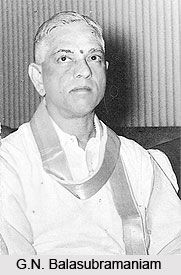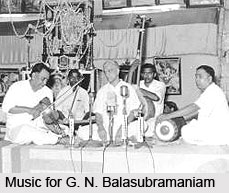 G. N. Balasubramaniam was born on 6th January in the year 1910. He was popularly known as GNB, and was a legendary vocalist in the traditional Carnatic music. He was the one who became the first renowned superstar of Carnatic music, thus, innovating the art through emphasis on laya control and reducing the Gamakas which eventually made Carnatic music appeal to the lay and the learned alike.
G. N. Balasubramaniam was born on 6th January in the year 1910. He was popularly known as GNB, and was a legendary vocalist in the traditional Carnatic music. He was the one who became the first renowned superstar of Carnatic music, thus, innovating the art through emphasis on laya control and reducing the Gamakas which eventually made Carnatic music appeal to the lay and the learned alike.
Early Life and Background of G. N. Balasubramaniam
G. N. Balasubramaniam was born in the small village of Gudalura near Mayavaram in Tanjore. He was born to G. V. Narayanaswamy Iyer, who was a dedicated student of music. Throughout his younger years, he also observed the utmost attention the methods which musicians used during his time. During the time when he was learning music, Ariyakudi Ramanuja Iyengar became his Manasika guru and inspiration. His father had different dream that of living in a villa at Luz Church road through GNB becoming a thriving lawyer. However, the young musician in GNB made way for larger goal in life.
He completed his Bachelor of Arts with Honours in English Literature at the prestigious Christian College, Chennai, and took up a short music course at Annamalai University, under the guidance of Sri T.S. Sabesa Iyer, but discontinued due to ill health. He later joined the diploma course in music under Madras University in the first batch and Sri Tiger Varachari was the Principal. Within 2 years, he was ready for concert performances. With his debut in 1928, his climb to the dizzying heights of Carnatic music was almost meteoric.
Career of G. N. Balasubramaniam
G. N. Balasubramaniam for most part of his career, have been criticized for composing fast Gamakam laden Sangathis with strength and weight and with wide imagination, running at so fast a speed through the effects of Brighas, twists and turns would come in quick succession that he became an instant hit with both the lay audience as well as those initiated to the arts and science of Carnatic music.

In the first half of the 20th century, nobody could sing ragas with an intellectual bend of mind like GNB, for he was the first concert musician to approach the concept of raga Alapana in a step-by-step approach. His approach soon inspired the great masters of the day including his arch rival Semmangudi Srinivasa Iyer. Semmangudi, overwhelmed by GNB`s overpowering musical genius, and the respect GNB had for Semmangudi`s style was noteworthy. Semmangudi Srinivasa Iyer though engaged in "black politics" to bring down G.N.B fame, regretted in the last years of G. N. Balasubramaniam of the sins he committed against a great human being as G.N.B. Semmangudi Srinivasa Iyer arranged a felicitation function by himself in 1964 to honour G.N.B. and primarily to make amends with the greatest legend Carnatic music has produced in the dawn of the performing era, that is G.N.B. As described in the autobiography of Sri G.N.B, "Ghandarva Ghanam", G.N.B. as moral & dignified as he was, did not insinuate any musician in his life neither did he allowed anyone to comment negatively on any musician in his presence. Apart from his phenomenal music, this alone earned him the praise from his embarrassed rivals and critics. He also raised the need to set a standard for critics to criticize a performing artiste.
Film offers flocked to GNB for his charismatic looks and musical talent. He acted in films, including Bhama Vijayam (Sathi Anusuya), Sakunthala (Udayanan Vasavadatta (with Vasundhara Devi, mother of Vijayanthimala), and Rukmangada. In "Sakunthalai", he appeared as Dushyantha, alongside the vocalist M.S. Subbulakshmi. M.S. Subbulakshmi was fascinated by his music and embraced his style completely in her early years as mentioned in the book M S - A Life in Music by TJS George. After a short stint in the film industry, GNB returned to the Carnatic music fraternity, due to the overwhelming demand for his performances till his passing in 1965.
Given the unusually high demand for his performances, his health deteriorated and worsened by an episode of a major stroke in the late 1950s, he died on 1 May 1965.
Style of Music for G. N. Balasubramaniam
As a musician with a revolutionary approach to Carnatic music, G.N.B made sure that many of his musical feats were technically and methodically feasible. With his charismatic speaking style and writing, he made his ideas clear and all opposition against his style faded quickly. With his charm, fame and yet humble personality, potential disciples flocked for his guidance in music.
G. N. Balasubramaniam was also the first major Carnatic musician to moot the idea of Indian music as a single entity rather than separating it into Hindustani and Carnatic systems. He was very attentive in understanding why HIndustani music concerts are so well loved by south Indians. By emphasizing on the richness of the composition together with expansive improvisation passages, he forever changed the way, Carnatic music was sung. His grasp of Tala was unprecedented for he understood the magic of singing in the 2nd and 3rd Kala which had a mesmerizing effect on the audience that he performed. Sometimes, reaching the 4th Kala in brisk succession would also arouse the ecstasy of his audience.




